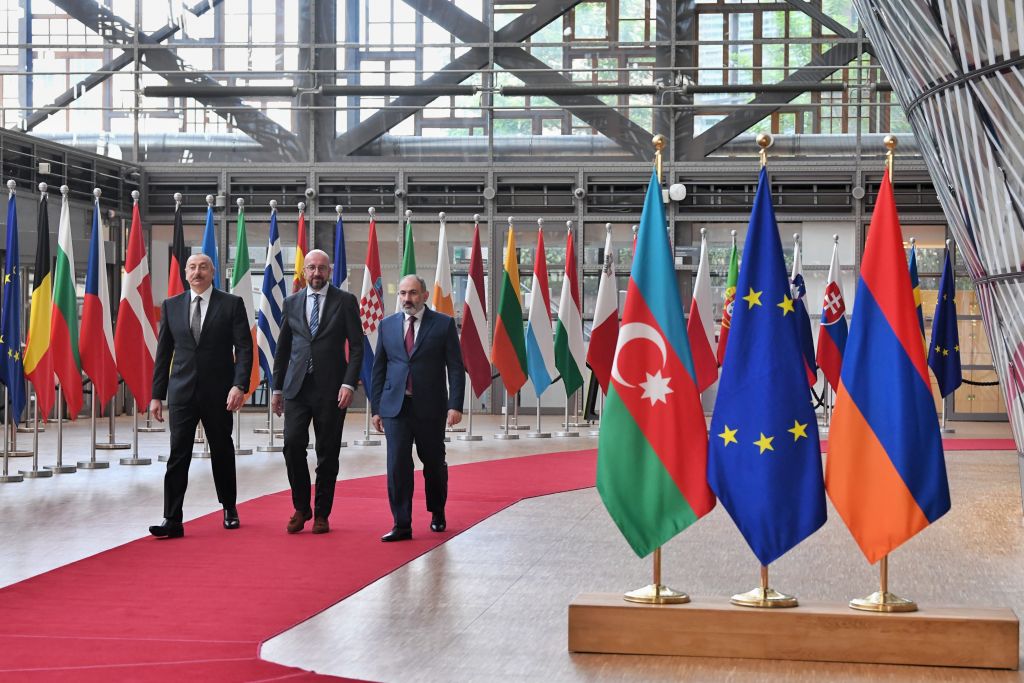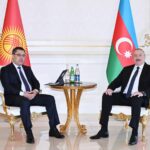The potential rapprochement runs parallel to the apparent progress Armenia and Turkey have made in establishing diplomatic ties and has the potential to upend the geopolitics of the South Caucasus. Despite progress, a number of forces, geopolitical interests of foreign powers, and internal politics in Armenia could scupper the potential deal, which could have far-reaching effects on the wider Black Sea region.
Recent Developments
In a summit that began May 22 in Brussels, Armenian Prime Minister Nikol Pashinyan and Azerbaijani President Ilham Aliyev agreed on transit lines, including the Zangezur corridor, and on the formation of an international committee to address the countries’ borders.
Though still far from reaching a definitive rapprochement, Armenia and Azerbaijan are poised to reach a tentative peace agreement. Over the past several months, Armenian officials have hinted at a major shift in Yerevan’s perspective on a long-simmering Nagorno-Karabakh conflict.
The first concrete sign came in March, when Baku released a framework document that stipulated the mutual recognition of territorial integrity of Armenia and Azerbaijan. Major points of the proposed peace treaty include the countries recognizing each other’s sovereignty and state borders, an end to territorial claims, and establishing diplomatic relations.
Armenia’s recognition of Azerbaijan’s sovereignty has been a contentious issue since the end of the First Nagorno-Karabakh War in the early 1990s. However, Yerevan did not object to the proposition in the current proposed treaty, though it added some further points for discussion, such as the rights and freedoms of the Armenian population in Nagorno-Karabakh. This reflects a shift in the Armenian leadership’s rhetoric over recent months – most notably when Pashinyan said in an interview that Nagorno-Karabakh was an integral part of Azerbaijan.
This is a major deviation from the official Armenian diplomatic rhetoric, which has traditionally regarded the separatist exclave as separate from Azerbaijan, a stance that has undermined every diplomatic attempt to solve the problem. Armenian politicians are denying that they have shifted their position, arguing that the self-determination of the Armenian population still represents Yerevan’s core demand. But this, along with recent positive rhetoric from Baku, indicate that the two sides are heading toward a significant rapprochement – one that most likely includes Armenia recognizing Azerbaijan’s territorial integrity.
Nonetheless, Armenia likely will require some concessions from Azerbaijan, such as special rights or autonomy safeguarding the lives of Armenian residents, the use of the Armenian language in schools or media, and maintaining the current land connection between Armenia and Nagorno-Karabakh. Baku may grant these kinds of liberties, which after all are significantly less than what Yerevan was demanding before 2020. Moreover, Azerbaijan also needs the deal as it will pave the way for the Zangezur corridor to its exclave of Nakhchivan – one of the stipulations of the November 2020 tripartite treaty that ended the Second Nagorno-Karabakh War.
Potential Obstacles
Armenia’s possible concessions are unlikely to go down well with the Karabakh Armenians who staunchly support the previous policy of total separation from Azerbaijan. In mid-April, Armenians in Nagorno-Karabakh even voiced a possibility of joining Russia, while the de-facto government broke with the rhetoric in Yerevan, announcing that living under Baku’s control is impossible for security reasons. Nevertheless, there is little the Karabakh Armenians could do as it is Yerevan which controls the negotiating process.
Pashinyan’s government also faces a less-patient audience in Armenia itself, where the ruling party is under constant pressure from the opposition forces. Former President Robert Kocharyan and his allies are not popular among ordinary Armenians, but they could undermine the government’s decision to move forward with a potential deal on Nagorno-Karabakh. On April 26 and 27, scuffles took place in central Yerevan amid protests against the potential deal. Since then, weeks-long demonstrations have taken place in Yerevan, but the threat to Pashinyan’s government does not seem to be existential. He is likely to weather the storm, as the former rulers of Armenia are mostly associated with a corrupt system that undermined the country. In fact, the consensus in Armenia is that the defeat in 2020 cannot be blamed solely on Pashinyan but on decades-long deprivations at the hands of the Republican Party of Armenia.
The Armenian government will also face stiff opposition from the powerful Armenian diaspora, which has already staged demonstrations calling for a boycott of the potential deal. This might evolve into diaspora members restricting financial and political support for Armenia from abroad, a move that would complicate the Armenian government’s position. However, a growing understanding is that the diaspora is largely detached from the realities within Armenia: Armenians in the diaspora have much more enmity with Turkey and Azerbaijan than Armenians living in Armenia.
Pashinyan is thus likely to survive a possible political crisis resulting from a deal with Azerbaijan. The wider spectrum of the population still supports the prime minister, mostly because there is no viable alternative but also because the present momentum behind the possible rapprochement with both Turkey and Azerbaijan will benefit Armenia both economically and geopolitically. The improved ties will help Armenia expand trade with Turkey and give it a new way to reach European markets. Moreover, the rapprochement means revived railway links and could turn Armenia from a regional pariah into an important actor in the South Caucasus.
Wider Geopolitical Picture
The change in Armenia’s rhetoric reflects the changes on the ground. With the Second Nagorno-Karabakh War, Azerbaijan gained significant power over its rival. Its victory failed to change the calculus of Armenia’s ally, Russia, and Baku has not received the support it hoped for from Moscow despite recent expanded bilateral relations – likely at least in part a result of Russia’s preoccupation with its ongoing invasion of Ukraine.
The progress in Armenian-Azerbaijani relations is also linked to the nascent rapprochement in Armenian-Turkish relations. Ankara and Yerevan expressed readiness to establish diplomatic ties and agreed to open their long-closed border for third-country nationals, a sign of Turkey’s growing role in the region. This role has both an infrastructure component – through the nascent corridor via Nakhchivan and the southernmost part of Armenia – as well as a military one, with Turkey expanding cooperation with Azerbaijan, seeing it as a launchpad for its ambitious vision of a mostly Turkic Central Asia, which has been on Ankara’s agenda but has regained prominence amid the war in Ukraine. Turkey increased the sale of arms and actively promotes the activation of the Middle Corridor from China to the Black Sea via Kazakhstan and the Caspian basin. Turkey’s growing role thus raises questions about Russia’s dominant position in the region and how genuinely interested Moscow is in the revival of railway infrastructure.
Nonetheless, despite Turkish inroads, Russia’s military capabilities still make it the most powerful player in the region. It has military bases in all South Caucasus states and is unlikely to withdraw from Azerbaijan in 2025 when the first term of its peacekeeping mission ends. Moreover, as a result of atrocities committed by Russia in Ukraine, France and the U.S. ended their cooperation with Moscow in the framework of the OSCE Minsk Group, the body overseeing the Nagorno-Karabakh peace process. This effectively left the Kremlin as the only power managing the process and thus accruing further influence.
This growing competition between Russia and Turkey sidelines a third critical player in the region: Iran. The country would naturally benefit from Armenia’s growing openness with its neighbors as it would help restore railway connections with Armenia and further with Russia, but there are also downsides for Tehran, which could lose its transit status between Nakhchivan and Azerbaijan proper if the corridor through Armenia becomes operational. That said, a recent deal with Azerbaijan on renewal of transit to Nakhchivan through Iranian territory shows it retains influence in the region.
Looking Ahead
Many questions remain around a possible Armenia-Azerbaijan rapprochement. A peace deal would have wide-ranging effects on the geopolitics of the South Caucasus, changing all paradigms governing the balance of power in the region since the 1990s. A new order will emerge where Russia will continue to play a critical role – alongside an increasingly influential Turkey. The EU, despite distancing itself following the 2020 war, will regain initiative. Iran’s position will be most vulnerable among large powers neighboring the region.
The developments in the South Caucasus are critical for the U.S., as they represent a vital part of the wider Black Sea region where, amid Russia’s invasion of Ukraine, the geopolitical balance of power is fluctuating. There is an opening for the U.S., through the EU and other Western institutions, to have a positive impact on the negotiation process for a potential deal and try to limit Moscow’s goal of excluding the West from the South Caucasus.
Emil Avdaliani is a professor at European University and the Director of Middle East Studies at the Georgian think tank, Geocase.











